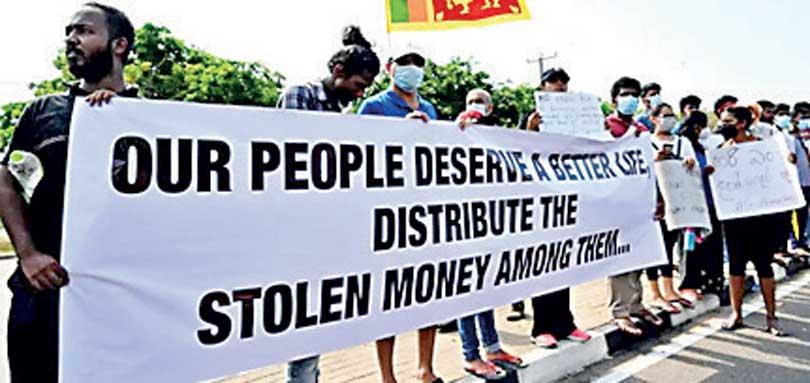Reply To:
Name - Reply Comment

A protest against corruption
 Failure to tackle corruption is a key factor that contributed to the economic crisis the country is faced with today. Taking concrete steps to reduce corruption, therefore, is critical to recover from the current crisis and to put the country on a sustainable growth path.
Failure to tackle corruption is a key factor that contributed to the economic crisis the country is faced with today. Taking concrete steps to reduce corruption, therefore, is critical to recover from the current crisis and to put the country on a sustainable growth path.
Public procurement is an important area the country has to focus on in its fight against corruption. Public procurement refers to the purchasing of goods and services by the government, ranging from stationary items to the services of contractors to construct ports and power plants.
Corruption in procurement pushes up the price of contracts, leading to the waste of scarce public funds. Research indicates that the amount lost on public contracts due to corruption can amount to 10–25% of a public contract’s value on average.
This article points out one of the critical shortcomings in the public procurement regulatory framework in Sri Lanka that makes it highly vulnerable to corruption. The current regulatory framework fails to recognise engaging in fraudulent and corrupt activities during procurement as a valid reason for blacklisting. Sri Lanka is in fact a backward outlier in the South Asian region in this respect.
What is blacklisting and why does it matter?
Blacklisting systems are designed to exclude firms that engage in corrupt and fraudulent activities, as well as those that fail to honour the terms and conditions of the contract (defaulting contractors). The presence of such wayward contractors or suppliers in the procurement system poses a risk to public funds.
Legal remedies such as blacklisting (also known as debarment) are introduced to prevent government agencies from doing business with such firms for a specified period. Such remedies are important to combat fraud, abuse, and waste in public procurement. In addition to blacklisting, the regulations in many countries also require the names of blacklisted firms, the reasons for blacklisting and the blacklisted periods to be published in an online database accessible to anyone.
The reputational damage and economic loss that result from being blacklisted and being put on a public list of blacklisted firms act both as a deterrent to future wrongdoers and as punishment for current wrongdoers. A well-designed and well-functioning blacklisting system also encourages companies that do not engage in such misconduct and have strong internal controls in place, to participate in procurement.
A key gap in Sri Lanka’s regulatory framework
Most of the procurement undertaken by government agencies – with a few exceptions such as pharmaceuticals – is governed by the Procurement Guidelines and the Procurement Manual introduced in 2006.
Although blacklisting is identified as an important tool to deter corruption, the 2006 Procurement Guidelines do not provide for the blacklisting of firms engaging in fraudulent and corrupt practices. The guidelines only provide for the blacklisting of contractors for default or failure to meet the terms and conditions of the contract, such as failure to carry out the contract in a satisfactory manner.
Section 1.4.4 of the guidelines states that the suppliers and contractors found to be guilty of “offering any gift or inducement” during the bidding stage can be disqualified from that particular bid. However, engaging in such corrupt practices is not identified explicitly as a valid reason for blacklisting. Being disqualified from a single bid will not have the same effect as being blacklisted, or in other words, being disqualified from engaging in future government contracts for a specified period (for example two to three years).
Fixing gaps in regulations is necessary but insufficient
Fixing the gap in law identified above is essential. However, the research reveals that alone is not sufficient to prevent corruption, in a system where officials and politicians can overlook the regulatory requirements without facing any consequences. For example, the current regulatory framework provides for the blacklisting of defaulting contractors, and the publication of their names online in a database accessible to the public. This is for contracts valued above LKR 5 million. The Department of Public Finance has a page on its website designed for this purpose. However, as of now, this online database does not have any names of blacklisted firms. The research conducted by Verité Research reveals that the respective government agencies have not complied with the existing blacklisting provisions.
Discussions with a senior official of the Ministry of Finance revealed that the online database was initiated only in 2020, despite the provisions for it being in existence since 2006. Further, only two firms have been included in the online database to date. They were blacklisted for two years – from 10th Dec 2020 and 12th Dec 2022.
The non-compliance with existing provisions clearly shows that the mere inclusion of fraud and corruption as valid reasons for blacklisting is insufficient to tackle corruption. It is also necessary to have in place provisions to ensure some form of penalisation for non-compliance.
Sri Lanka is a backward outlier
In many other countries across the world, fraud and corruption are common grounds for blacklisting. A survey by the World Bank among ten jurisdictions found fraud, corruption, and collusion (bid rigging) as common grounds for blacklisting/debarment. The countries and governing bodies surveyed include Australia, Brazil, Chile, Germany, Italy, Spain, Tunisia, the United Kingdom (UK), the United States (US) and the European Commission.
Further, South Asian countries such as Bangladesh, Bhutan, India, Maldives, Nepal, and Pakistan also recognise engaging in fraudulent and corrupt practices as a valid reason for blacklisting of contractors or suppliers (in addition to default). These countries also have in place functional online databases of blacklisted/debarred companies. The list published by the Public Procurement and Monitoring Office of Nepal had 629 entries as of July 2023. The list published by Bangladesh as of July 2023 had 510 entries. As mentioned earlier, Sri Lanka’s online database had only two entries, and at present has none.
Tackling corruption & safeguarding public funds
The governance diagnostic of the International Monetary Fund (IMF) has rightly recognised public procurement as an area with high vulnerability to corruption. One of the priority recommendations of the IMF is to introduce a procurement law in line with international best practices by December 2024.
However, Sri Lanka need not wait for another year to fix the problem of blacklisting. The non-compliance with existing provisions can be addressed without delay. Furthermore, until a more comprehensive law is introduced, nothing is preventing the Cabinet from amending the guidelines to include fraud and corruption as valid reasons for blacklisting – except the will to do so.
Subhashini Abeysinghe is an economist and the Research Director at Verité Research.